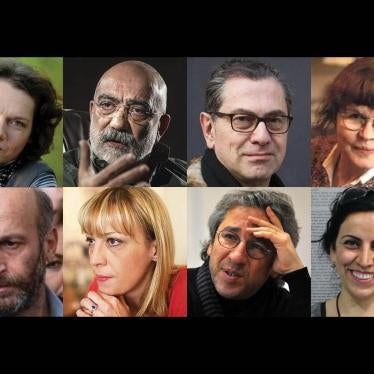In a reportCrackdown In The Farghona Valley:Arbitrary Arrests and religious discrimination , Human Rights Watch charged that the Uzbekistan government is committing serious abuses in its drive to quell alleged Islamic extremism.
Those abuses include mass arbitrary arrests, violation of freedom of religion, and "disappearing" Islamic leaders.
The Human Rights Watch report focuses on abuses committed during widespread, brutal sweeps by the police and security forces beginning in December 1997 in the Farghona Valley, an Islamic stronghold in this Central Asian nation. Human Rights Watch calls on the government of Uzbekistan to cease arbitrary arrest and police brutality and protect peaceful religious expression. It also urges the European Union to suspend implementation of its Partnership and Cooperation Agreement with Uzbekistan, and the U.S. government to invoke restrictions on assistance to security forces believed to have committed human rights violations.
"The government is painting all Muslims with the same brush _ those who may have criminal intent, and average Muslims who simply wear a beard or go to the mosque," noted Holly Cartner, Executive Director of Human Rights Watch's Europe and Central Asia Division. "It is subjecting Muslims on a mass scale to beatings, show trials, expulsions from universities and jobs, and lengthy prison terms."
According to the 31-page report, which was released to the Uzbekistan government today by a visiting delegation from Human Rights Watch, the police have singled out openly pious Muslims, or dissidents or their relatives, to intimidate and silence them. Human Rights Watch charges that police detained suspects typically without an arrest warrant, planted small amounts of marijuana or several bullets, a handgun, or a grenade on their person, in their car, or in their home during a search, and beat them until they confessed to the crime. Planting such evidence was reportedly so widespread during the crackdown that, according to local residents, men in that area tried to wear clothing without pockets to help deter such set-ups.
The report charges that Uzbekistan's secular government, ruling a rapidly growing population of 22 million, is intolerant of religious expression that it deems too radical or nonconformist. For example government universities have expelled some students on the eve of their college graduation for wearing head scarves or sporting beards as signs of Islamic piety. It has also closed down mosques whose congregations seemed overly loyal to local imams, and "disappeared" at least two popular religious figures in the Farghona Valley.
Islam has played a volatile role in the wars and civil strife in Tajikistan and Afghanistan, both of which border on Uzbekistan. But by prominently denouncing Islamic extremism, the government of President Islam Karimov is trying to focus popular attention on supposed internal enemies to deflect social discontent, the report charges. It described the government as highly repressive in the Soviet style, with heavy censorship, puppet "alternative" political parties, and scores of political prisoners. The poor economy has also bred widespread discontent with the government.
The Human Rights Watch report is meant "to sound an alarm that the government, by committing serious, wide scale human rights abuse in this volatile area, runs the risk of provoking precisely the radical and even criminal response it has vowed to avert."
Journalists interested in further information may also contact Holly Cartner of the Human Rights Watch delegation in Tashkent at the hotel Le Meridien.








